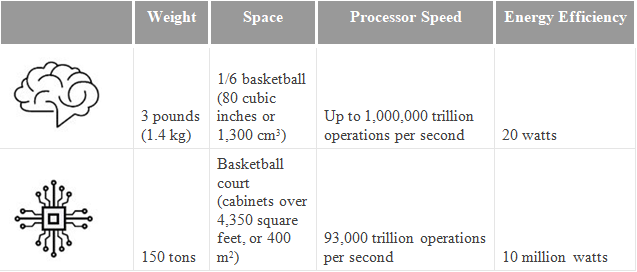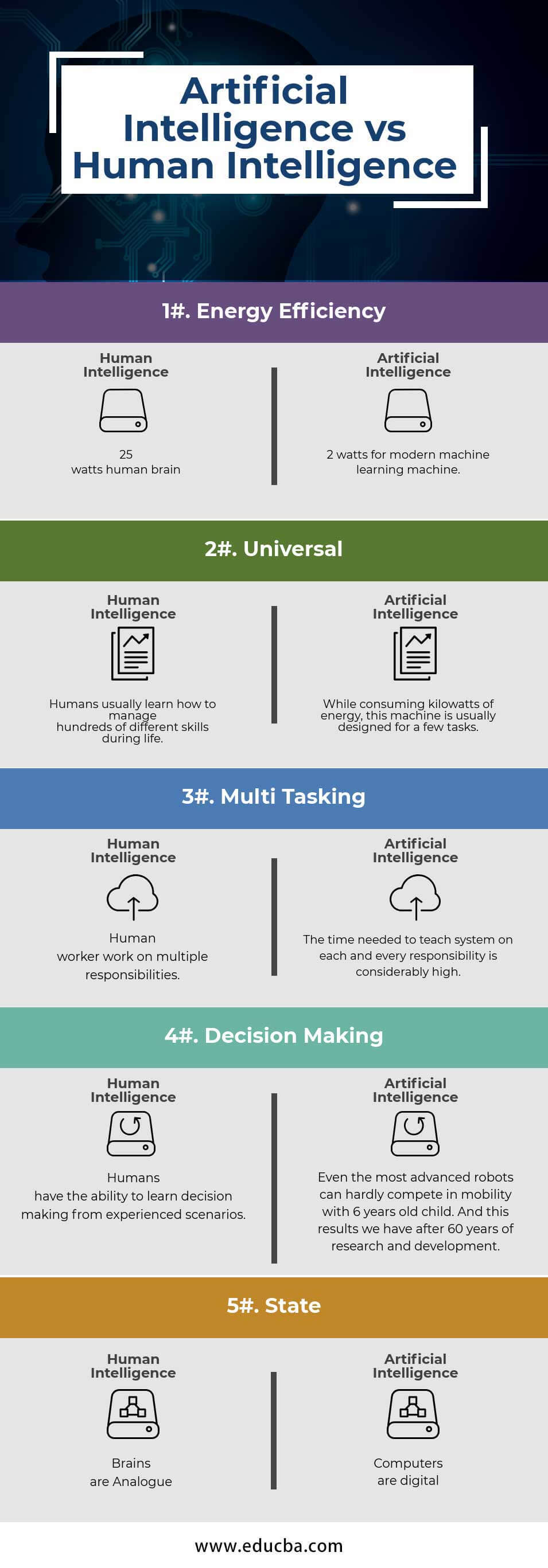Updated June 19, 2023
Differences Between Artificial Intelligence vs Human Intelligence
Intelligence can be defined as a general mental ability for reasoning, problem-solving, and learning. Because of its public nature, intelligence integrates cognitive functions such as perception, attention, memory, language, and planning. Based on this definition, intelligence can be reliably measured by standardized tests, with obtained scores predicting several broad social outcomes such as educational achievement, job performance, health, and longevity. So let’s study the differences between Artificial Intelligence and Human Intelligence in detail.
Artificial Intelligence
Artificial Intelligence is the study and design of Intelligent agents; these intelligent agents can analyze the environments and produce actions that maximize success. AI research uses tools and insights from many fields, including computer science, psychology, philosophy, neuroscience, cognitive science, linguistics, operations research, economics, control theory, probability, optimization, and logic.AI research also overlaps with tasks such as robotics, control systems, scheduling, data mining, logistics, speech recognition, facial recognition, and many others.
Human Intelligence
Human Intelligence is defined as the quality of the mind that is made up of capabilities to learn from experience, adapt to new situations, handling of abstract ideas, and the ability to change the environment using the gained knowledge.
Human Intelligence can provide several kinds of information. It can provide observations during travel or other events from travelers, refugees who escaped friendly POWs, etc. It can provide data on things about which the subject has specific knowledge, which can be another human subject or, in the case of defectors and spies, sensitive information to which they had access. Finally, it can provide information on interpersonal relationships and networks of interest.
Comparison of Brain with a Supercomputer
Advantages of Artificial Intelligence vs Human Intelligence
- Speed of execution – While one doctor can make a diagnosis in ~10 minutes, AI system can make a million for the same time.
- Less Biased – They do not involve Biased opinions on the decision-making process
- Operational Ability – They do not expect a halt in their work due to saturation
- Accuracy – Preciseness of the output obviously increases
- Artificial Intelligence has significant dominance in many tasks, especially when it comes to monotonous judgments.
Head to Head Comparison Between Artificial Intelligence vs Human Intelligence
Below are the Top 5 differences between Artificial Intelligence and Human Intelligence:
Key Differences Between Artificial Intelligence and Human Intelligence
Below are the lists of points that describe the key differences between Artificial Intelligence and Human Intelligence:
Nature of Existence
Human intelligence revolves around adapting to the environment using a combination of several cognitive processes.
The field of Artificial intelligence focuses on designing machines that can mimic human behavior.
Memory usage
Humans use content memory and thinking, whereas robots use built-in instructions designed by scientists.
Mode of creation
Human intelligence is more significant because of its creation by God, and artificial intelligence, as the name suggests, is fake, tiny, and temporarily created by humans. Also, Humans intelligence is the real creator of artificial intelligence, but they cannot create a human being with superiority.
Learning process
Human intelligence is based on the variants they encounter in life and the responses they get, which may result in millions of functions overall in their lives. However, Artificial intelligence is defined or developed for specific tasks only, and its applicability to other tasks may not be challenging.
Artificial intelligence can beat human intelligence in some specific areas; in Chess, a supercomputer has topped the human player due to being able to store all the moves played by all humans so far and being able to think ahead 10 moves as compared to human players who can think 10 steps ahead but cannot store and retrieve that number of moves in Chess.
Points to Note
- The accelerating rate of technological change makes it likely that people will have the computational capacity and scientific knowledge to create AGI in the next few decades.
- Having AGI will be beneficial to humanity. For example, it may enable humans to mitigate global problems such as climate change.
- It may also lead to an increase in the economic growth rate and production level.
- Intelligent and super-intelligent machines are the future of humanity.
Artificial Intelligence vs Human Intelligence Comparison Table
Following is the set of points shows the comparison between Artificial Intelligence and Human Intelligence:
| Comparison Factor | Human Intelligence | Artificial Intelligence |
| Energy efficiency | 25 watts human brain | 2 watts for modern machine learning machine |
| Universal | Humans usually learn how to manage hundreds of different skills during life. | While consuming kilowatts of energy, this machine is usually designed for a few tasks. |
| Multitasking | Human workers work on multiple responsibilities. | The time needed to teach the system on each and every response is considerably high. |
| Decision Making | Humans can learn decision-making from experienced scenarios. | Even the most advanced robots can hardly compete in mobility with 6 year old child. And these results we have after 60 years of research and development. |
| State | Brains are Analogue | Computers are digital |
Conclusion
Human intelligence revolves around adapting to the environment using a combination of several cognitive processes. The field of Artificial intelligence focuses on designing machines that can mimic human behavior. However, AI researchers are able to go as far as implementing Weak AI, but not Strong AI. In fact, some believe that Strong AI is never possible due to the various differences between the human brain and a computer. So, at the moment, the mere ability to mimic human behavior is considered Artificial Intelligence.
Also, the utilization of artificial intelligence will surely make life even more convenient for humankind in the years to come and even force humans to evolve their skill sets; it will perhaps never be possible for such machines to replace human resources completely.
Recommended Articles
We hope that this EDUCBA information on “Artificial Intelligence vs Human Intelligence” was beneficial to you. You can view EDUCBA’s recommended articles for more information.




